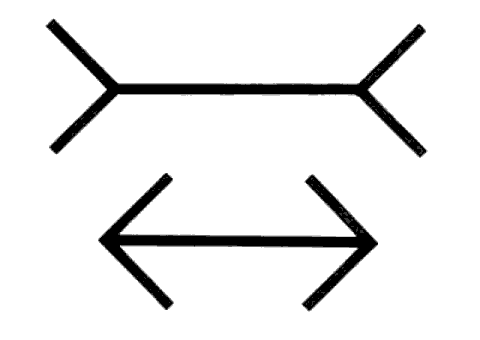In a fast-paced presentation at TEDGlobal 2012, Eddie Obeng discussed how essential it is to see change coming and be prepared to make seismic changes in educational policy quickly since the world adapts. This, he argues, is the biggest challenge because as soon as data are collected and changes are made the data are already obsolete thanks to the speed with which the world turns.
For example, he discussed an image with two arrows (the Mullerr-Lyer illusion) as outlined in Figure 1 below) and asked the audience which one was longer. The majority of respondents stated, “the same” when in reality one was longer than the other. Why did the respondents reply that way? It is because usually when presented with a very similar figure the answer is “the same” and those looking immediately thought back their conditioned response even though it was incorrect. This, Obeng argues, is part of the problem. The issue is that conditioned responses lead us to not think on our own and to rely solely on previously learned data. If this is the way of the world then how could humanity possibly make appropriate advancements to close the achievement gap?
Figure 1: The Muller-Lyer Illusion (Barhelme, 2009).

Obeng argues that in order to make serious change, society needs to take big risks. The biggest problem? People are not likely to do so because if the idea fails then the employee is at risk of losing a job. This is exactly where he believes change is needed since creativity leading failure should be rewarded because, when it does work, it can change the game and help people lean in bold new ways. Society has taught us that it is best to do the same thing that has always been done and not to go against the flow. Perhaps it is time to dam up the flow and see which creative idea leads to the breakthrough.
References
Barthelme, S. (2009). Culture and perception, part II: The Muller-Lyer illusion. Retrieved from: http://cognitionandculture.net/blog/simons-blog/culture-and-perception-part-ii-the-muller-lyer-illusion.
Obeng, E. (2012). Smart failure for a fast-changing world. TEDGlobal 2012. Retrieved from: https://www.ted.com/talks/eddie_obeng_smart_failure_for_a_fast_changing_world/up-next